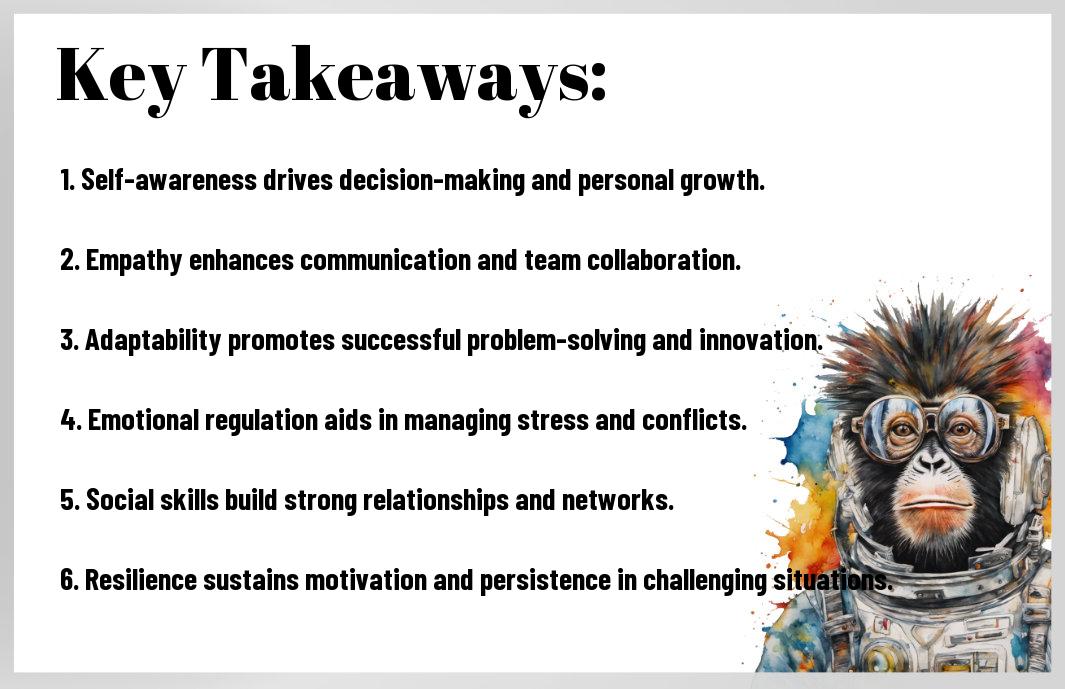The Role Of Emotional Intelligence In Effective Entrepreneurial Leadership
Effective entrepreneurial leadership requires more than just business acumen and strategic decision-making skills. Emotional intelligence plays a critical role in shaping successful leaders in the competitive business landscape. Understanding emotions, managing interpersonal relationships, and embodying self-awareness are imperative components for entrepreneurs to navigate challenges, inspire teams, and drive innovation. In this blog post, we will research into the significance of emotional intelligence in cultivating effective entrepreneurial leadership and explore how it contributes to the long-term growth and sustainability of businesses.
Key Takeaways:
- Emotional intelligence (EI) is crucial for effective entrepreneurial leadership: Leaders with high EI can understand, manage, and leverage their emotions to motivate and inspire their teams.
- Self-awareness is the foundation of EI: Understanding one’s emotions, strengths, and weaknesses is important for effective leadership in entrepreneurship.
- Empathy is key in building strong relationships: Entrepreneurs with empathy can connect with their team members, understand their perspectives, and create a supportive work environment.
- Effective communication is enhanced by EI: Leaders who are emotionally intelligent can communicate clearly, listen actively, and resolve conflicts more effectively.
- Emotional regulation is important in high-pressure situations: Entrepreneurial leaders need to be able to manage their emotions in stressful situations to make sound decisions and lead effectively.
- Adaptability and resilience are traits of emotionally intelligent leaders: Being able to adapt to change, learn from failures, and bounce back from setbacks are crucial for entrepreneurial success.
- Continuous development of EI is beneficial: Entrepreneurs can enhance their leadership skills by investing in activities that improve their emotional intelligence, such as practicing mindfulness, seeking feedback, and attending EI workshops or training.

Understanding Emotional Intelligence in Leadership
While exploring the dynamics of effective entrepreneurial leadership, understanding the concept of emotional intelligence is paramount. Emotional intelligence plays a crucial role in leadership by shaping how individuals perceive and manage emotions, both their own and those of others. To explore deeper into this topic, you can also refer to What is the role of emotional intelligence in effective leadership?.
Components of Emotional Intelligence
On the journey towards mastering leadership with emotional intelligence, one must first grasp the key components that make up this vital skill set. These components typically include self-awareness, self-regulation, empathy, motivation, and social skills. By honing these aspects, leaders can navigate complex interpersonal relationships with finesse and understanding.
Emotional Intelligence as a Leadership Skill
Intelligence in leadership involves the ability to recognize, understand, and manage both personal and interpersonal emotions effectively. This skill is particularly valuable in entrepreneurial settings where leaders must navigate high-pressure situations, motivate teams, and build strong relationships with stakeholders. Leaders who possess high emotional intelligence are better equipped to inspire and influence others towards a shared vision, ultimately driving greater success for their ventures.
Emotional intelligence as a leadership skill also encompasses the capacity to remain calm under pressure, make informed decisions based on emotional cues, and cultivate a culture of trust and collaboration within their teams. By leveraging emotional intelligence, entrepreneurial leaders can create positive work environments that foster innovation and growth.
Emotional Intelligence in the Entrepreneurial Context
The Challenges Faced by Entrepreneurs
Intelligence is crucial in the entrepreneurial world where individuals face a multitude of challenges. Entrepreneurship requires decision-making under uncertainty, handling rejection, managing stress, and navigating complex interpersonal relationships. These challenges can test one’s emotional strength and ability to lead effectively.
How Emotional Intelligence Benefits Entrepreneurs
Entrepreneurs with high emotional intelligence have a competitive edge in the business world. They can effectively manage their emotions, understand and influence others, and handle interpersonal conflicts with finesse. This ability to navigate emotionally charged situations positively impacts team dynamics, customer relationships, and overall business success.
With emotional intelligence, entrepreneurs can anticipate and respond to the needs and concerns of their team, customers, and stakeholders with empathy and understanding. This builds trust, fosters collaboration, and ultimately drives innovation and growth within the organization.
Developing Emotional Intelligence for Entrepreneurial Success
Strategies to Enhance Emotional Intelligence
For entrepreneurs looking to enhance their emotional intelligence, there are several strategies that can be implemented. These include self-awareness exercises, such as journaling or mindfulness practices, seeking feedback from peers or mentors, and engaging in emotional intelligence training programs. By actively working on these strategies, entrepreneurs can improve their ability to recognize and manage their emotions effectively in various business situations.
Integrating Emotional Intelligence into Business Practices
The integration of emotional intelligence into business practices is crucial for fostering a positive work environment and enhancing overall business performance. By prioritizing emotional intelligence in leadership development programs, decision-making processes, and team dynamics, businesses can create a culture that values empathy, communication, and collaboration. This, in turn, can lead to increased employee satisfaction, higher productivity, and improved customer relations.
Emotional intelligence plays a significant role in effective entrepreneurial leadership by fostering self-awareness, empathy, and relationship management skills. Integrating emotional intelligence into business practices can lead to better decision-making, improved communication, and enhanced team dynamics, ultimately contributing to the success and growth of the business.

Final Words
So, emotional intelligence plays a crucial role in effective entrepreneurial leadership by enhancing an individual’s ability to manage their own emotions, understand the emotions of others, and navigate through challenging situations with empathy and resilience. Entrepreneurs who possess high emotional intelligence are better equipped to build strong relationships, communicate effectively, and make sound decisions that benefit both their team and their business. By cultivating emotional intelligence, entrepreneurs can lead with confidence, inspire others, and create a positive work environment that fosters innovation and success. Ultimately, integrating emotional intelligence into entrepreneurial leadership practices can lead to greater business outcomes and personal growth for both the leader and their team.
FAQ
Q: What is emotional intelligence?
A: Emotional intelligence refers to the ability to understand and manage one’s own emotions, as well as being able to recognize and influence the emotions of others.
Q: How does emotional intelligence contribute to effective entrepreneurial leadership?
A: Emotional intelligence plays a crucial role in effective entrepreneurial leadership by helping leaders understand and connect with their team members, handle conflicts, make better decisions, and inspire and motivate others.
Q: What are the key components of emotional intelligence in entrepreneurial leadership?
A: The key components of emotional intelligence in entrepreneurial leadership include self-awareness, self-regulation, social awareness, and relationship management.
Q: How can entrepreneurs develop their emotional intelligence?
A: Entrepreneurs can develop their emotional intelligence by engaging in self-reflection, seeking feedback from others, practicing empathy, improving communication skills, and managing stress effectively.
Q: Why is emotional intelligence imperative for entrepreneurial success?
A: Emotional intelligence is imperative for entrepreneurial success because it helps leaders build strong relationships, navigate challenges effectively, make sound decisions, and create a positive work culture.
Q: How does emotional intelligence impact decision-making in entrepreneurial leadership?
A: Emotional intelligence impacts decision-making in entrepreneurial leadership by helping leaders consider the emotional implications of their choices, understand different perspectives, and make decisions that align with their values and goals.
Q: Can emotional intelligence be learned and improved over time?
A: Yes, emotional intelligence can be learned and improved over time through self-awareness, practice, feedback, and a willingness to continuously develop and enhance one’s emotional intelligence skills.






